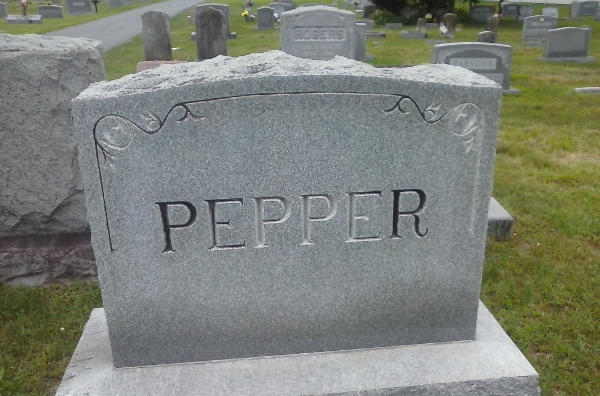A Pepper Grinder Post
Mourning
As I write this, I'm still coming to grips with the death of my father over six months ago. He was 97 years old, so his death wasn't unexpected. He wasn't distressed about dying. I was able to spend a couple days with him just before he died. Most of the time, I go through my daily life and don't think about the fact that he's dead, but every now and then I'll have a thought like, "I should tell Dad about that. He'd find that interesting." Or I'll think of some question I'd like to ask my father. At those times, I suddenly realize again that he's gone, and it hurts.
This has made me think about death, and how people in the modern western world deal with it. In many cultures, past and present, there have been clearly defined practices for what one did when someone close to them died.
 So what are the mourning rituals practiced where I live, in present-day America? The big one seems to be what I would call the word of consolation. After my father died, many people who heard about it told me something to the effect of, "I'm sorry for your loss." I really think that most of the people who said this to me were expressing genuine sympathy, even if it sounded a little like a catch phrase. Other than that, the main things we do surround the funeral or memorial service. There might be a viewing; there might be times for people to share recollections of the deceased; there might be a meal for people to share. All this got me wondering about how people in the Bible dealt with mourning.
So what are the mourning rituals practiced where I live, in present-day America? The big one seems to be what I would call the word of consolation. After my father died, many people who heard about it told me something to the effect of, "I'm sorry for your loss." I really think that most of the people who said this to me were expressing genuine sympathy, even if it sounded a little like a catch phrase. Other than that, the main things we do surround the funeral or memorial service. There might be a viewing; there might be times for people to share recollections of the deceased; there might be a meal for people to share. All this got me wondering about how people in the Bible dealt with mourning.
The first thing to point out is that the Bible, as far as I can see, never commands people to mourn their dead or to mourn in a certain way. (There are specific instances and situations where God commands something about mourning, like the serving high priest not being allowed to mourn for dead family members, but there is no general command given to everyone.) Instead, it seems to be assumed that mourning will happen, sort of like sleeping. Indeed, mourning was such a natural part of life that Jesus speaks of children playing games where they pretend to grieve for the dead (Matthew 11:17). Mourning was seen as part of the natural cycle of life; there was a time to rejoice, and a time to mourn (Ecclesisastes 3:4).
Another thing about mourning in the Bible that seems very strange to our western ears is that mourning was considered an important duty to the dead person. For someone to die and not be mourned was a very bad thing (1 Kings 14:13; Jeremiah 22:18). Mourning was so important that people would sometimes hire people to grieve for their deceased relative. This might explain the strange incident that takes place when Jesus came to heal the daughter of Jairus in Luke 8:41-56. When the distraught father was told that his daughter was dead, Jesus told him to believe and she would be healed. Here's where the strange thing happened: the crowd of people wailing and weeping for Jairus's daughter, abruptly stopped grieving and started laughing at Jesus. How could they shift gears like that? I suspect the answer is that they were going through the motions of grieving, either out of duty or because they were being paid, but were not truly feeling sad.
Mourning in the Bible probably happened most frequently after someone's death, but there were also times when people mourned over their own sin (Exodus 33:4, for example) or the sins of others. My Moan and Groan posting is one example of mourning over the sins of others. Another example is Samuel grieving over Saul's unfaithfulness (1 Samuel 15:35).
Now we come to the fascinating question of what people did when they were mourning. As mentioned before, we don't find a passage that tells us something like, "Here's what you should do whenever someone dies." We have to rely on passages that mention how people were mourning, and on passages where God, in a specific situation, tells people not to do something they would normally do when mourning.
 For example, when two of Aaron's sons were killed by God in Leviticus 10 because they disobeyed God's commands about how the priests should worship him, Aaron and his other sons who are priests are told not to let their hair become unkempt and not to tear their clothes. When Ezekiel's wife dies, he is told not to mourn out loud, but to keep his turban on his head and his sandals fastened on his feet, and not to trim his mustache (the Hebrew literally says, "don't wrap yourself in your mustache")(Ezekiel 24:17). I think the general idea is that when people were mourning, they stopped focusing on their personal appearance.
For example, when two of Aaron's sons were killed by God in Leviticus 10 because they disobeyed God's commands about how the priests should worship him, Aaron and his other sons who are priests are told not to let their hair become unkempt and not to tear their clothes. When Ezekiel's wife dies, he is told not to mourn out loud, but to keep his turban on his head and his sandals fastened on his feet, and not to trim his mustache (the Hebrew literally says, "don't wrap yourself in your mustache")(Ezekiel 24:17). I think the general idea is that when people were mourning, they stopped focusing on their personal appearance.
Many passages speak of people weeping and wailing when they were in mourning. Going back to the verse I just mentioned in Ezekiel 24:17, where Ezekiel is told what to do when his wife dies, he is told, "Groan quietly; do not mourn for the dead." (NIV) This, along with other passages, implies that grieving in Bible times was not usually a quiet affair. One final thing that Ezekiel is told in 24:17 is not to "eat the customary food of mourners." I have no idea what the customary food of mourners was, though in light of other mourning practices, it would make sense to me if it was food that was simple and plain, rather than delicacies.
There are some practices that might be associated with mourning for the dead, but that are seen most often in connection with people grieving over and repenting from sin. These include fasting, wearing sackcloth, and rolling in ashes.
Everything I've mentioned so far is something that I do not see people doing in modern America. There is one mourning practice mentioned in the Bible that I have seen in action. In Jeremiah 16:7, God is announced his judgment against the Israelites and said that many people would be killed and not mourned. He said, "No one will offer food to comfort those who mourn for the dead--not even for a father or a mother--nor will anyone give them a drink to console them." (NIV) This may not be a universal practice in modern America, but I definitely think that sometimes people give food to people who have lost someone.
Another interesting question is how long mourning lasted in the Bible. In Genesis 50, we read that Jacob was mourned by the Egyptians for 70 days, and then Joseph did another 7 days of mourning on his own. Moses and Aaron were mourned for 30 days each by the Israelites (Deuteronomy 34:8 and Numbers 20:29). According to the Law of Moses, a foreign woman who was captured in war and chosen as a wife, was allowed a period of 30 days to mourn for her father and mother. Genesis 37:34 and 2 Samuel 14:2 are more vague, and mention only that someone was mourned for "many days." As was said about what was done when grieving, the Bible only gives us a shadowy record of how long some mourning periods lasted, rather than a command about what should be done.
What disturbs me about mourning in the culture I live in is not that we don't grieve the way people did in the Bible, but that we often seem to try to avoid grieving at all. We fill our lives with funny movies and TV shows to make us laugh and distract us from the things that make us sad. Many people take drugs, prescription or otherwise, to try to keep from feeling sad. Then there is always the age-old practice of denial. To me, it seems that in many other times and cultures, the reaction to grief was to go through it, perhaps even doing things to feel it more intensely. In my culture, it feels as though many people simply want to avoid it, and to feel as little sadness as possible. This is also reflected in the subtle attitudes that many people have toward people who are in mourning. There is initial sympathy, but all too often, this is followed by a spoken or unspoken desire for the bereaved person to "snap out of it" and "get on with life."
 I think that if we are someone who is grieving, we need to allow ourselves to feel sad. Look for ways to express that sadness, whether through crying, deliberately remembering the person you've lost, or expressing your feelings in some creative way, like through a poem or a song. I think we should take the time of grieving as a chance to focus on things beyond this life. Even if you choose to still trim your mustache and comb your hair, try to focus more on eternal realities than on temporary things like what you wear and eat. Finally, I don't think we should rush ourselves. Especially with someone close to you, it is going to take time to get over that loss. I think this is true even in a case where the person is not actually dead, but separated from you for some other reason, as in the case of an estranged child or spouse.
I think that if we are someone who is grieving, we need to allow ourselves to feel sad. Look for ways to express that sadness, whether through crying, deliberately remembering the person you've lost, or expressing your feelings in some creative way, like through a poem or a song. I think we should take the time of grieving as a chance to focus on things beyond this life. Even if you choose to still trim your mustache and comb your hair, try to focus more on eternal realities than on temporary things like what you wear and eat. Finally, I don't think we should rush ourselves. Especially with someone close to you, it is going to take time to get over that loss. I think this is true even in a case where the person is not actually dead, but separated from you for some other reason, as in the case of an estranged child or spouse.
I'm reminded of the story of Almanzo Wilder, told by his wife, Laura Ingalls Wilder, in The First Four Years (the last in the series of books written by Laura, often referred to as the Little House books, the most famous of which is Little House on the Prairie). The book tells of how Laura and Almanzo caught diptheria. They were recovering, but were strictly warned by the doctor against overexertion until they were fully well. Almanzo ignored the warning and ended up having partial paralysis in his legs for the rest of his life. In the same way, I think that if we try to short-circuit grief, we can end up with a kind of emotional paralysis.
I think we also need to watch our attitudes if we know someone who is grieving. Remember, even if they don't act differently, they may very well still be mourning inside. Cut them some slack; don't get impatient with them because they don't bounce back fast enough. There is a place for trying to cheer someone up. But remember that Romans 12:15 commands us to "mourn with those who mourn" (NIV). There are times we need to let someone feel sad and be willing to join in that sadness with them.
I do not think we need to follow any particular mourning rituals, but I think it's important that grieving people be allowed to mourn and to be reminded how temporary this life is.
- Pepper
Posted 2017-10-28
